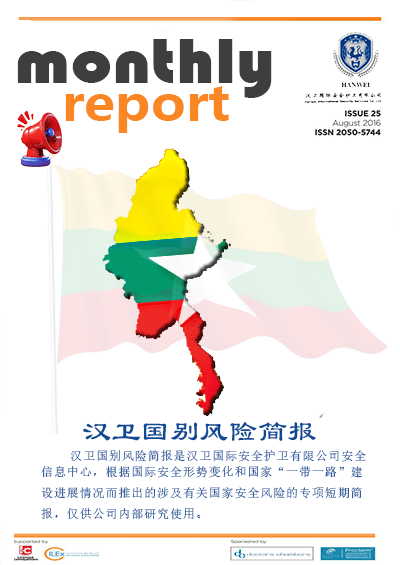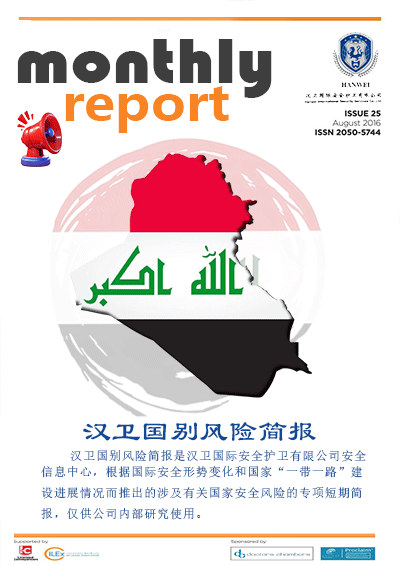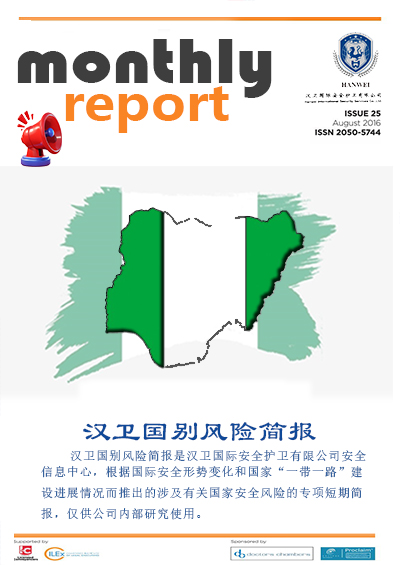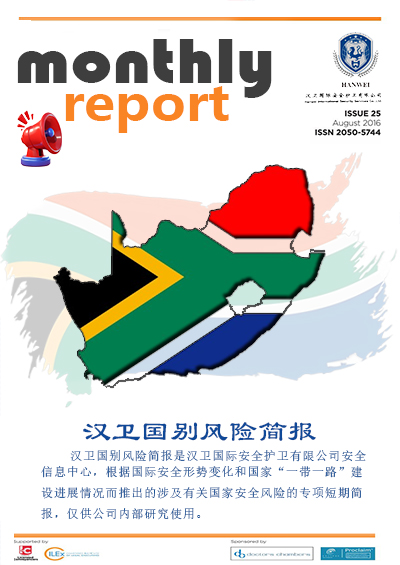Myanmar Risk Monthly Report - November 2024
According to Hanwei International's security monitoring report, Myanmar recorded 112 representative security incidents in November, an increase of 12 from October. These incidents resulted in 131 deaths and 243 injuries. The main security categories were bomb attacks, airstrikes, and robberies, primarily occurring in Shan State and Mandalay.
Hanwei International analysis indicates Myanmar's security situation remains tense. While incident numbers slightly increased from the previous month, deaths decreased and injuries significantly reduced. The Ta'ang National Liberation Army (TNLA) issued a statement expressing readiness to explore solutions through dialogue to ease military tensions. To end military conflicts and establish stable political peace, they will actively cooperate with neighboring countries' mediation efforts, seeking positive outcomes through dialogue to comfort war-affected civilians. However, Myanmar's future direction and whether true peace can be achieved remain uncertain.
Promoting Peace Talks, Internal Willingness to Negotiate
November 11 - U.S. bipartisan lawmakers including the Senate Republican leader and Foreign Relations Committee chairman sent a letter to Secretary of State Antony Blinken and USAID Administrator Samantha Power, urging U.S. attention to Myanmar's conflict and development of comprehensive strategic policies. The letter emphasized maintaining U.S. leadership. Recent election results suggest Trump's victory may accelerate implementation of the Myanmar Act.
November 7 - Junta leader Min Aung Hlaing stated at the GMS Summit in Kunming that ethnic armed organizations along the China-Myanmar border refuse peace talks, destabilizing the region. During meetings with Premier Li Qiang, he expressed willingness to negotiate with the "Three Brotherhood Alliance."
November 12 - Indonesian President Prabowo Subianto met with Biden at the White House. Biden affirmed U.S. support for ASEAN's leading role in resolving Myanmar's crisis and fully backed the Five-Point Consensus and UN Special Envoy's efforts.
November 16 - The G7 urged Myanmar's junta to release detainees, hold inclusive talks, and cease all violence including airstrikes.
November 26 - Thailand deployed troops to the Myanmar border, demanding the United Wa State Army (UWSA) withdraw from 9 bases within one month. The UWSA advocated for government-level peaceful resolution. Border tensions escalated with the Thai Foreign Minister's visit on November 27.
November 4 - Myanmar ethnic armed organizations and 11 political parties held constitutional discussions in New Delhi to address the situation, though no resolutions were passed.
November 29 - The junta-aligned Democratic Karen Buddhist Army (DKBA) and anti-junta New Mon State Party (NMSP) met in Kayin State's Payathonzu to establish checkpoints and de-escalate tensions.
November 26 - The military and TNLA reached a stalemate in Nawnghkio, with TNLA shifting to defensive posture and expressing readiness for negotiations.
Declining Foreign Investment, Severe Fiscal Deficit
November 21 - As the Arakan Army intensified southern Rakhine offensives, the military reinforced Kyaukphyu defenses, causing local bank closures.
November 27 - DICA reported foreign investment plummeted to $226 million (April-October 2024), the lowest since the coup, covering 33 projects across 12 sectors. The 2024-25 budget deficit is projected at 787.9 billion kyat, with borrowing capped at 9.6 trillion kyat.
SAC forecasts 34.743 trillion kyat revenue against 42.622 trillion kyat expenditures. World Bank's 2024 International Debt Report shows $12.1 billion external debt (36% to Japan, 15% private lenders, 28% international institutions).
Ongoing Combat, Worsening Livelihoods
In conflict zones (Rakhine, Shan, Kachin, etc.), displaced civilians face food shortages as farming becomes impossible. Transportation difficulties and instability have driven prices up, exacerbating hardships.
November 21 - UNICEF reported 650+ child casualties from conflicts, with 18.6 million needing humanitarian aid (including 6 million children requiring $208 million). Over 2 million have been displaced since 2021.
Myanmar's 2024 Humanitarian Response Plan has only received 28.5% of required funding. WFP reported 13.3 million (25% population) face food insecurity, with emergency aid targeting conflict-affected groups.
Widespread Attacks, Deteriorating Security
November 3-10 - 71 clashes killed 84+ in Rakhine, Kachin, and Sagaing.
November 6 - Fighting in Bago's Kyaukkyi and Kyaukkyi killed 13, while Karen National Liberation Army ambushes killed 14 soldiers.
November 11 - Military attacks in Mogok killed 20 civilians. Airstrikes in Nga Zun killed 1, while drone strikes damaged 6 aircraft at Meiktila Air Base.
November 15 - Chin resistance's "Chin Brotherhood Operation" triggered heavy fighting in Falam and Mindat, with subsequent airstrikes causing casualties.
November 26-28 - Military airstrikes in Falam killed 10, while artillery in Hpakant killed 19. Karenni forces ambushed troops near Loikaw (30+ killed).
Hanwei International Recommendations: November 15 - Myanmar's junta established a working committee per China's proposal to form a joint security company. The committee will oversee weapon imports and ensure operations protect Chinese interests without compromising Myanmar's sovereignty. Chinese security firms should unite to advance this initiative.
Emergency Contacts: Myanmar Police: 0095-199 | Medical: 0095-192 | Chinese Consulate (Mandalay): 0095-9-259172726 | Chinese Embassy: 0095-9-43209657 | MOFA Global Hotline: 0086-10-12308/65612308
Chart 1: Classification of Security Incidents in November

Chart 2: Classification Statistics of Deaths/Injuries in November

Chart 3: Statistics of Security Incidents in Major Provinces in November

Chart 4: Comparison of the Number of Major Security Incidents in November and October





